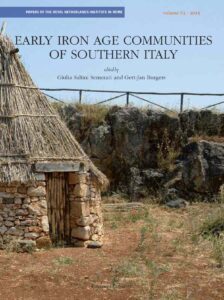 In recent years, as current geopolitical phenomena have heightened interest in mobility and culture contact, academic discourse has intensified over the nature of past migrations, colonisations and interactions. Greek colonisation has figured prominently in such discussions due to recent archaeological discoveries combined with the growing influence of postcolonial and globalisation theories. The result is a fresh understanding of colonial contexts borne of the recognition that interaction dynamics were shaped not only by new settlers but also by the people they encountered. Southern Italy has yielded an especially rich corpus of recent evidence of pre-colonial indigenous occupation, and early phases of contact and settlement. However, research in this and other colonized regions has long privileged a Greek perspective, bounded geographically and chronologically by the colonies’ foundation. The newly recognised importance of indigenous populations within colonial dynamics has not been matched by research efforts into organisation and diachronic developments. Particularly pressing is the lack of knowledge about the social organisation of indigenous communities both before and after Greek colonisation. To address this research lacuna, this book shifts the emphasis from the Greek colonies to the indigenous communities among which they settled, bringing together new perspectives and results. The focus is on three important aspects of social organisation: status, gender and territory. Important advances recently made by researchers of Southern Italy in all three areas are showcased. These clearly show that before colonization, indigenous communities in Southern Italy were already proceeding down a complex path of development – a trajectory that was intercepted by Greek settlers to produce unique localised dynamics of interaction, adoption, conflict and continuity.
In recent years, as current geopolitical phenomena have heightened interest in mobility and culture contact, academic discourse has intensified over the nature of past migrations, colonisations and interactions. Greek colonisation has figured prominently in such discussions due to recent archaeological discoveries combined with the growing influence of postcolonial and globalisation theories. The result is a fresh understanding of colonial contexts borne of the recognition that interaction dynamics were shaped not only by new settlers but also by the people they encountered. Southern Italy has yielded an especially rich corpus of recent evidence of pre-colonial indigenous occupation, and early phases of contact and settlement. However, research in this and other colonized regions has long privileged a Greek perspective, bounded geographically and chronologically by the colonies’ foundation. The newly recognised importance of indigenous populations within colonial dynamics has not been matched by research efforts into organisation and diachronic developments. Particularly pressing is the lack of knowledge about the social organisation of indigenous communities both before and after Greek colonisation. To address this research lacuna, this book shifts the emphasis from the Greek colonies to the indigenous communities among which they settled, bringing together new perspectives and results. The focus is on three important aspects of social organisation: status, gender and territory. Important advances recently made by researchers of Southern Italy in all three areas are showcased. These clearly show that before colonization, indigenous communities in Southern Italy were already proceeding down a complex path of development – a trajectory that was intercepted by Greek settlers to produce unique localised dynamics of interaction, adoption, conflict and continuity.

